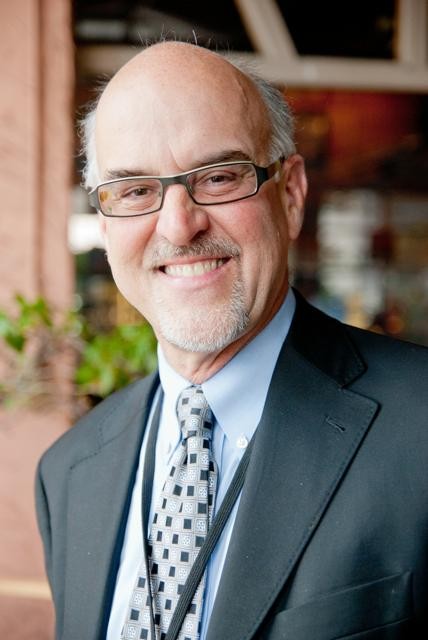- Republican commissioner Joe Belcher has been pushing for an across the board freeze on nonprofit spending. photos by Max Cooper
- “There's hundreds of nonprofits in the community, and we're all losing support and looking for other revenues. It all is on pretty shaky ground.” – Ann Flynn, Helpmate
- “Governing is choosing. And I hope the Graduation Initiative is chosen. I think it's a wonderful program. It touches thousands of thousands of lives.” – Bill Murdock, Eblen Charities
- "Great cities have great civic institutions. And it's been a long time in this community since there's been a great investment in cultural infrastructure." – Pam Myers, Asheville Art Museum
Grappling with their toughest budget in a decade, the Buncombe County commissioners have been debating austerity measures that would put the squeeze on many local nonprofits for the foreseeable future. And amid a still-sputtering economy, most of those groups are already struggling after years of rising demand and dwindling funding sources.
“Ever since the recession started, our requests for services have really gone up," notes Ann Flynn, interim executive director of Helpmate, which serves victims of domestic violence.
The county, however, is equally squeezed, caught between a reassessment that reduced property values and unfunded state and federal mandates that must be met. Confronted with the prospect of bumping up the property tax rate to close the gap, some freshman Republican commissioners are looking to brandish the budgetary scalpel, taking aim at nonprofits as a way to fulfill campaign promises by trimming spending.
Representatives of those groups, however, say the county’s investment in their work yields valuable results — and ultimately saves taxpayers money through increased tax revenues and reduced social-service costs.
Meanwhile, the 4-3 partisan split on the the newly expanded Board of Commissioners looms large, underscoring the significance of Democrat Ellen Frost’s disputed, razor-thin margin of victory in last fall’s election. Back-room negotiations appear to have scaled back the most severe proposals for curtailing nonprofit spending. But as the commissioners continue to scrutinize a budget that must be finalized next month, a host of projects and services still hang in the balance.
Reining it in
Amid that uncertainty, funding requests have skyrocketed as the new fiscal year approaches this July. Of Buncombe’s more than 1,600 nonprofits, 31 are collectively asking for about $8.64 million, dwarfing the roughly $1.26 million awarded last year.
That’s raising the eyebrows of Republican Commissioner Joe Belcher, a freshman whose successful District 3 campaign last fall was largely based on reining in government spending. When he first saw the spike, says Belcher,"I went, 'Oh my god, really?'"
He subsequently developed a proposal that would have barred nonprofits’ annual funding requests from exceeding the inflation rate, as determined by the Bureau of Labor Statistics’ consumer price index. Belcher’s measure would also have capped county funding at 25 percent of a nonprofit's operating budget, and prohibited contributions to groups whose administrative costs accounted for more than 12 percent of their budget.
Those changes would have amended a 2008 policy that already required an intensive application process and oversight of how county dollars are spent. Ultimately, says Belcher, he’d like to limit the money groups can request for years to come, putting an end to the kind of annual petitions on display at the county’s recent budget retreat, when representatives of about 30 nonprofits lined up, one after another, to make personal appeals to the commissioners.
"We can't just say … you can ask for whatever you want," Belcher maintains. "When requests are made, you've got to have some kind of policy. If you don't, the requests will just continue to go out of control. Just because you have a great heart and a great cause doesn't mean the county will be able to fund every bit of it. That's the bottom line."
To Belcher's chagrin, however, subsequent behind-the-scenes talks with his fellow commissioners resulted in a more modest proposal being placed on the board's May 7 agenda. The revised version, for example, would not tie funding requests to inflation. But with Democrats holding a majority on the board, the Republican says his options were limited.
“A lot of the things you feel strongly about, you don’t get," Belcher noted May 2, adding, "I'm excited about what's in there as a start." At press time, the commissioners hadn't voted on the retooled measure yet, but Belcher said he expected it to pass. Meanwhile, he’s also pushing for an across-the-board freeze on nonprofit spending.
Indeed, Belcher believes his primary job as a commissioner “is to try to save the taxpayers some money. This is step one," he notes. "There will be other suggestions, but we're dealing with this right now."
Show me the money
But will cutting county funding really save taxpayers money? Many in the local nonprofit sector say the answer is no.
Bill Murdock, executive director of Eblen Charities, says the Graduation Initiative, a collaboration between his group and the Buncombe County Schools, has raised the high school graduation rate from 73 percent to 80 percent since its inception in 2006.
"That's a tremendous reduction in dropouts, which means a tremendous help to the economy, certainly down the road," he maintains.
Because high school graduates earn so much more during their working life, each of those 584 additional graduates will mean $275,000 more for the county — a whopping $160.6 million all told — through increased tax revenues and reduced costs for health care, criminal justice and public assistance, Murdock asserts.
This year, he is asking the commissioners for $50,000 for the program, which has received roughly $722,000 since 2006 from a mix of public and private funding sources. But there's no question, Murdock says, that taxpayers are getting a good return on their investment.
Pam Myers, director of the Asheville Art Museum, also makes an economic argument for the $2.9 million she’s seeking to help fund a $24 million facility upgrade. The county invested $100,000 in the project last year; to date, about $8.6 million has been raised from various public and private sources. But that investment, she says , will generate $7 million a year in economic activity, including $300,000 in local government revenue.
"It's a terrific investment for taxpayers. The return on it is extraordinary, both in strict dollars and cents and in those less tangible things that are critical to our community: sense of pride, education, culture and creativity, all of those things," Myers maintains. "Great cities have great civic institutions. And it's been a long time in this community since there's been a great investment in cultural infrastructure."
Current policy limits the county to $500,000 per nonprofit per year for capital projects. Buncombe Chairman David Gantt, the only current commissioner who was on the board when those requirements were approved in 2008, says he still supports them. But the county, he notes, could choose to give the museum $500,000 per year until the total was reached.
Myers, meanwhile, says, "We have lots of support on the commission, and I'm putting my faith in them figuring it out.”
The buck stops where?
In the emerging funding debate, Gantt, a Democrat, says that while he's open to new ideas, he feared that Belcher's original proposal could have gotten in the way of worthwhile partnerships. The existing policy, Gantt believes, already ensures sufficient accountability.
"I don't think a cookie-cutter approach, where you make rules so you don't have to make decisions, is our job. Because at the end of the day, we're judged by the buck stopping here," Gantt asserts. "I'm worried that somebody won't fit into the exact pigeonhole that we've created, but they have a great project that really would make a difference for the people of Buncombe County, and we really want to do it, and then we say, ‘We can't do it because of this policy.’”
The current push to scrutinize nonprofit spending is not without precedent, notes Gantt. In 2002, he recalls, the commissioners voted 3-2 to slash funding for public schools and nonprofits alike to head off a possible tax hike. At a press conference the next day, both Gantt and then-Commissioner Patsy Keever, who cast the opposing votes, railed against the decision.
"I couldn't believe they did it," he remembers, adding that if Belcher's real goal is "to cut off service, I don't think that's appropriate."
A better approach to partnering with nonprofits, argues Gantt, is what happened when the county outsourced much of its primary-care services to Western North Carolina Community Health Services in 2010. Instead of spending $4.5 million to provide medical and dental care for 9,000 low income residents through the county Health Department, Buncombe now pays WNCCHS $2.3 million to leverage the same care for 13,248 patients.
The money hunt
Republican Commissioner Mike Fryar praises the WNCCHS contract for saving the county money, but he shares Belcher's skepticism when it comes to spending on nonmandated services.
Fryar says he's been "spending a lot of time looking and scribbling" on the list of nonprofits, marking possible cuts, though he's not yet ready to reveal his plans. The freshman commissioner eked out a narrow win in District 2 last year with a campaign that stressed the need for fiscal discipline. And like Belcher, Fryar says local nonprofits can find funding elsewhere.
"It comes to a point where we have to say, 'Slow down: We can't go there now. Go out and hunt some money.' These people can raise money; I'm sorry," Fryar asserts.
And Belcher maintains that the constraints he proposed "should make the nonprofits better" by forcing them to reduce administrative costs and seek other funding sources.
Flynn, however, says that’s easier said than done, as local groups find themselves in an increasingly competitive situation. “There [are] hundreds of nonprofits in the community … and at any one given time, we're all losing support and looking for other revenues. It all is on pretty shaky ground at various times, and this is one of those times.”
Meanwhile, the same tough economy that leads to revenue shortfalls and tight budgets also escalates the need for services. Unemployment, notes Flynn, often exacerbates the kinds of problems Helpmate deals with; her agency is requesting $40,000 this year (up from the $16,000 the county contributed in the current budget) to help provide clients with counseling and emergency shelter.
And if that seems like a lot, she continues, the financial costs of domestic violence are “staggering.” Taxpayers, argues Flynn, “can't afford not to invest in social programs."
— Jake Frankel can be reached at 251-1333, ext. 115, or at jfrankel@mountainx.com.








Before you comment
The comments section is here to provide a platform for civil dialogue on the issues we face together as a local community. Xpress is committed to offering this platform for all voices, but when the tone of the discussion gets nasty or strays off topic, we believe many people choose not to participate. Xpress editors are determined to moderate comments to ensure a constructive interchange is maintained. All comments judged not to be in keeping with the spirit of civil discourse will be removed and repeat violators will be banned. See here for our terms of service. Thank you for being part of this effort to promote respectful discussion.